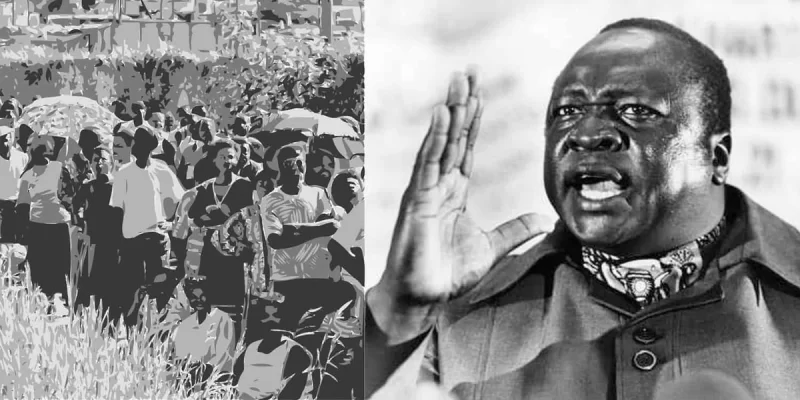Opinion
The Fallacy Of Iron-Handed Leadership: A Biblical Perspective On Rulership And Accountability, by Isaac Asabor

In Nigeria, as in many parts of the world, there is a pervasive belief among politicians and leaders that they can evade the consequences of their actions. Many corrupt leaders and bad politicians operate under the illusion that they will go unpunished, confident that their wealth, power, and influence will shield them from justice. However, this belief is rooted in a dangerous misunderstanding. It is a lie to think that they can escape divine retribution because, as the Bible consistently shows, God rules over the affairs of men. Leaders may enjoy temporary immunity from accountability, but history and scripture prove that no one escapes the judgment of God.
The Bible is clear on one foundational truth: God governs the world, including the rise and fall of leaders. Daniel 4:17 reminds us, “The Most High rules in the kingdom of men, and gives it to whomever He will.” This verse makes it abundantly clear that no leader is beyond the reach of God’s will, and none can rule without divine oversight. Leaders may think they are untouchable, but their reign is allowed by God for reasons only He knows, and they are ultimately accountable to Him.
In Nigeria, the failure to acknowledge God’s supreme rule is at the heart of many leadership crises. Politicians amass wealth through corrupt practices, impoverishing the masses while living lavishly. Some believe they are immune to any form of accountability, both from the people and from God. But this mindset is a gross misunderstanding of the workings of divine justice. Proverbs 16:4 says, “The Lord has made everything for its purpose, even the wicked for the day of trouble.” Leaders may rule corruptly for a time, but they are unwittingly fulfilling a purpose that will culminate in their reckoning.
A closer look at the Bible offers examples of leaders who believed they could escape judgment, only to face the inevitable consequences of their actions. Take the story of King Nebuchadnezzar, a powerful ruler who thought he was invincible. He became prideful and believed his kingdom was built by his own might. God swiftly humbled him, making him live like an animal in the wilderness until he acknowledged that “the Most High is sovereign over all kingdoms on earth” (Daniel 4:25). Nebuchadnezzar learned the hard way that no leader is above God’s rule.
Similarly, in the New Testament, King Herod Agrippa, puffed up by pride, accepted praise from the people who claimed his voice was that of a god and not a man. Acts 12:23 recounts his downfall: “Immediately, an angel of the Lord struck him down, because he did not give God the glory, and he was eaten by worms and died.” Herod’s arrogance led to his swift and humiliating demise, proving once again that God rules overall and no leader can escape His judgment.
Leaders today, particularly those in Nigeria, should take heed of these lessons. The belief that they can go unpunished for corrupt governance and the oppression of their people is a grave misconception. It is true that some may seem to thrive in their corruption for years, even decades, but the wheels of divine justice turn in God’s timing, not ours.
Psalm 37:1-2 offers encouragement to those who feel disheartened by the apparent success of corrupt leaders: “Do not fret because of those who are evil or be envious of those who do wrong; for like the grass they will soon wither, like green plants they will soon die away.” Though justice may seem delayed, it is inevitable.
In Nigeria, where leaders frequently enrich themselves while leaving the people in poverty, the temptation to believe that corrupt politicians will go unpunished is understandable. But scripture reassures us that no one, no matter how powerful, is beyond divine judgment. Even if their downfall is not immediate, it is certain.
God’s timing often frustrates human expectations. As Ecclesiastes 8:11 notes, “When the sentence for a crime is not quickly carried out, people’s hearts are filled with schemes to do wrong.” This is true in Nigeria today, where the slow pace of justice encourages more corruption. But while human justice may falter, God’s justice is sure. No leader can outrun His judgment, though they may prosper for a time.
In fact, God often allows tyrants and corrupt leaders to rise for specific reasons. As seen in the story of Pharaoh in Egypt, God hardened his heart and allowed him to rule oppressively to demonstrate His power through the liberation of the Israelites. But Pharaoh’s end came swiftly and decisively when God’s judgment finally fell upon him (Exodus 14:28). Leaders like Pharaoh may seem invincible for a time, but God’s purpose will always prevail.
To think that any leader who rules with cruelty and impoverishes the people will go unpunished is to deny the sovereign rule of God tantamount to foolhardiness. Scripture offers numerous examples of leaders who thought they could escape divine judgment, only to meet their end in humiliating or tragic ways. Nigerian politicians should take heed: no amount of power, wealth, or influence can shield them from God’s justice.
As Psalm 75:7 reminds us, “It is God who judges: He brings one down, he exalts another.” The belief that corrupt leadership can persist without consequence is a dangerous and false notion. While the people may suffer under bad leadership for a time, justice, whether divine or through the course of history, will eventually prevail. Leaders, particularly those in Nigeria, would do well to remember that they rule not by their own might, but by the grace of God, and they are ultimately accountable to Him.
























